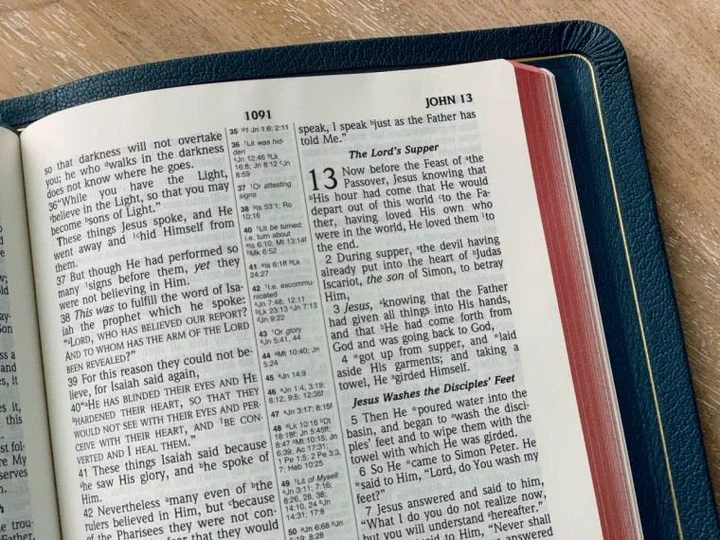
You've probably heard of some long names in the Bible, like Nebuchadnezzar or Chushanrishathaim. But do you know which names are the longest? There are some super lengthy ones.
In this article, we'll go through the top 10 longest names found in the Bible, and look at the verses where they appear, and learn some interesting facts about each one. You might need to take a deep breath before trying to pronounce some of these marathon monikers. But their meanings and the stories behind them are fascinating. So get ready to be wowed by the lengthiest names in the Good Book.
What is the Longest Name in the Bible?
Mahershalalhashbaz is the longest personal name found in the Bible. This lengthy name appears in Isaiah 8:1-3 and means "quick to the plunder, swift to the spoil" in Hebrew. This name has a total of 18 letters (Maher-Shalal-Hash-Baz), making it the longest name mentioned in the Bible.
It refers to Isaiah's son, whose name served as a symbolic prophecy about the imminent attack on Israel by Assyria. The name's meaning warned that enemy forces would soon plunder and spoil the lands of the northern kingdom.
The Lord commanded Isaiah to write this name on a large tablet as a sign for the people. When Isaiah's wife conceived and bore a son, God instructed him to name the child Mahershalalhashbaz as an omen.
Before the boy could even speak the long name, the riches of Damascus and Samaria would be plundered by the king of Assyria as judgment for the kingdom's sins and lack of faith.
So Mahershalalhashbaz's name encapsulated God's message to the rebellious Israelites. Though lengthy and difficult, this symbolic name warned of the devastating consequences awaiting them due to their disobedience and idol worship.
The very presence of this uniquely long name highlights how Scripture often employed signs, symbols and metaphors to convey profound spiritual truths. Mahershalalhashbaz stands as an intriguing example of this biblical practice.
10 Longest Names in the Bible
You're about to dive into the world of ridiculously long names from the Bible. Get ready for some serious tongue twisters! These names are no joke. We're talking about monikers so lengthy, you'll need to take a deep breath before attempting to pronounce them. You might be wondering, "Why on earth would anyone need such a drawn-out name?" Well, back in those days, names often carried deep symbolic meaning or commemorated significant events. The longer the name, the more meaningful it was considered.
Without further ado, let's give you a sneak peek at the top contenders for the longest biblical names.
Mahershalalhashbaz - The longest name in the Bible
Mahershalalhashbaz is considered the longest name mentioned in the Bible. But what does this tongue-twisting moniker actually mean? Let's break it down:
Maher = hastening Shalal = spoil Hashbaz = to plunder or take away by violence. This name appears in the Book of Isaiah, referring to one of Isaiah's sons. In chapter 8, verse 3, God instructs Isaiah to name his newborn son Mahershalalhashbaz as a prophetic sign against the kingdoms of Israel and Syria.
The lengthy name symbolized that before the child could call for his father or mother, the riches of Damascus and Samaria would be plundered by the Assyrian empire. True to the name's meaning, the two kingdoms faced devastation at Assyrian hands within a few years.
While certainly a mouthful, Mahershalalhashbaz serves as an intriguing example of how names in Scripture often convey deeper meanings. This particular name foreshadowed imminent judgment on the rebellious nations.
For Bible students exploring prophetic literature, unpacking the layers behind Mahershalalhashbaz offers insights into Isaiah's role and God's sovereignty over the events unfolding in that era. Despite its complexity, this name reminds us that every detail in God's Word is intentional and profound.
Chushanrishathaim
Chushanrishathaim was an ancient king who oppressed the Israelites for eight years, according to the Bible. His name, meaning "doubly wicked" in Aramaic, hints at his tyrannical reign.
The book of Judges 3:8-10 provides details on this obscure figure:
"The anger of the Lord burned against Israel...so he sold them into the hands of Cushan-Rishathaim king of Aram...But when they cried out to the Lord, he raised up for them a deliverer."
God allowed this pagan ruler to subjugate Israel as punishment for their disobedience. Yet when they repented, He provided Othniel to defeat Chushanrishathaim, a reminder that true freedom comes through obedience to God.
While little else is known about this king, his story warns against straying from God's path. His very name symbolizes the wickedness that enslaves those who reject the Lord.
Zaphnathpaaneah
Zaphnathpaaneah is considered one of the longest names in the Bible. It belongs to Joseph, the son of Jacob, from the book of Genesis. This Egyptian name was given to Joseph by the Pharaoh after he had interpreted the king's dreams.
According to Genesis 41:45, the name Zaphnathpaaneah means "revealer of secrets" or "the man to whom secrets are revealed" in Egyptian. It highlighted Joseph's gift of dream interpretation and wisdom.
When Joseph rose to power under Pharaoh, he embraced an Egyptian identity and name. Zaphnathpaaneah represented Joseph's new status as the second-in-command over Egypt. It marked a pivotal point in his story, from being a slave to becoming a ruler.
The lengthy name stands as a testament to Joseph's faith journey and God's faithfulness in his life. It reminds us that our identities are not fixed but can be transformed through our circumstances and relationship with the Lord.
Tilgathpilneser
Tilgathpilneser, also called Tilgath-pileser, was an Assyrian king who reigned from around 745-727 BC. The Bible mentions him a few times, like in 2 Kings 15:29 when it says Tilgathpilneser invaded Israel and captured some territories. He's also named in 1 Chronicles 5:6 and 5:26 as the Assyrian king who exiled the Israelite tribes of Reuben, Gad, and half of Manasseh.
Tilgathpilneser expanded the Assyrian Empire through military conquests. He strengthened Assyria's control over regions like Syria, Phoenicia, and even parts of Israel.
His conquests left quite an impression; archaeologists have found inscriptions and monuments commissioned by Tilgathpilneser boasting about his victories. In the Bible, Tilgathpilneser represents the growing might of Assyria that ultimately led to the fall of the northern kingdom of Israel in 722 BC. His long name may be a mouthful, but his impact on biblical events was huge.
Merodach-Baladan
Merodach-balagan was the king of Babylon who sent envoys bearing letters and gifts to Hezekiah, the king of Judah (2 Kings 20:12). Merodach-balagan, son of Baladan, king of Babylon.
But why did Merodach shoot his shot with Hezekiah? The Bible suggests it was a clever political maneuver. You see, Hezekiah had recently recovered from a severe illness (2 Kings 20:1-11). Merodach seized the chance to congratulate him and likely forge an alliance against their common Assyrian foes.
His approach was smooth, and gifts always helped to butter up a potential ally. And Hezekiah, perhaps flattered by the attention, gladly showed off his treasures to the Babylonian envoys (2 Kings 20:13). Little did he know, this hospitable move would eventually lead to trouble down the road (2 Kings 20:16-18).
Nebuchadnezzar
Nebuchadnezzar was the powerful king of the Babylonian Empire from around 605-562 BC. His life and reign are detailed throughout the Book of Daniel in the Bible.
In Daniel 2, we learn that Nebuchadnezzar had a troubling dream which only Daniel could interpret. This dream foretold future world empires, cementing Nebuchadnezzar's role in biblical prophecy.
After seeing his mighty kingdom in a vision, Nebuchadnezzar became arrogant and boastful (Daniel 4:30). As punishment, God humbled him by giving him a mental illness for seven years, living like a wild animal.
Once restored, Nebuchadnezzar praised the Most High God (Daniel 4:34-37). His story warns against unchecked pride and promotes reverence for the Lord.
Beyond the Bible, ancient historians like Berossus confirm Nebuchadnezzar's existence. His military conquests and construction feats, like the Hanging Gardens of Babylon, solidify his place as one of antiquity's most influential rulers.
Mephibosheth
Mephibosheth was the son of Jonathan, the beloved friend of King David. He was the last surviving heir of Saul's royal lineage. When Mephibosheth was just 5 years old, news of Saul and Jonathan's deaths shook the kingdom. In the chaos, his nurse dropped him while fleeing, leaving him crippled in both feet. (2 Samuel 4:4)
Years later, King David sought to honor his covenant with Jonathan by showing kindness to any of Saul's remaining family. He discovered Mephibosheth, now a poor and lame man, and restored to him all the lands of his grandfather Saul. (2 Samuel 9:1-13) Mephibosheth was overwhelmed by David's generosity, calling himself a "dead dog" unworthy of such kindness.
Mephibosheth's story beautifully illustrates the grace and mercy God extends to sinners through Christ. Like Mephibosheth, we are crippled by sin, helpless to save ourselves. But God, in His kindness, has provided a way through Jesus for undeserving people to be lavished with His forgiveness and eternal inheritance.
Chedorlaomer
Chedorlaomer was a powerful king, as mentioned in Genesis 14. He ruled over the region of Elam, which is modern-day Iran. The Bible portrays him as a formidable ruler who conquered several kings and their cities.
Genesis 14:1-4 describes how Chedorlaomer formed an alliance with three other kings, Amraphel of Shinar, Arioch of Ellasar, and Tidal of Goiim. Together, they waged war against five kings who had rebelled after serving Chedorlaomer for twelve years.
In this battle, Chedorlaomer and his allies defeated the rebel kings, capturing many people and plundering their possessions (Genesis 14:11-12). Among the captives was Lot, Abraham's nephew, who lived in Sodom.
Upon hearing of Lot's capture, Abraham gathered 318 trained men from his household and pursued Chedorlaomer's forces (Genesis 14:14). In a daring night raid, Abraham defeated Chedorlaomer's army, rescued Lot and the other captives, and recovered all the plundered goods (Genesis 14:16).
While a relatively minor character, Chedorlaomer's appearance in Scripture highlights Abraham's faith and courage, setting the stage for God's covenant promises.
Hazarmaveth
Hazarmaveth is mentioned in the Bible as one of the sons of Joktan, a descendant of Shem (Genesis 10:26). Little is known about him beyond this genealogical reference.
His name is thought to be linked to the ancient region of Hadramawt in southern Arabia. The meaning of "Hazarmaveth" may derive from the Arabic words "hadar" (dwelling) and "mawt" (death), suggesting a possible tie to this arid, inhospitable area.
While scarce on specific details, Hazarmaveth's inclusion reinforces the biblical account of humanity's dispersion from the ancient Near East into Arabia and surrounding lands after the confusion of languages at the Tower of Babel (Genesis 11:9). His descendants likely formed one of the nomadic tribes that settled this part of the Arabian peninsula in antiquity.
Ammishaddai
Ammishaddai is one of the most obscure names in the Bible, appearing only once in Numbers 1:12. The name refers to the leader of the tribe of Dan, who assisted Moses in taking a census of the Israelites.
The meaning of "Ammishaddai" is uncertain, but scholars believe it likely derives from two Hebrew words:
"Ammi" meaning "my people" or "my kinsman"
"Shaddai" being one of the names for God, meaning "Almighty."
So Ammishaddai may mean something like "the Almighty is my kinsman" or "my kinsman is the Almighty."
Beyond noting his role in the census, the Bible offers no other details about Ammishaddai. He's not mentioned again after Numbers 1:12, leaving his story untold. Still, his unique name hints at the rich cultural and religious heritage preserved in ancient texts.
People often wonder about the historical or cultural significance behind these lengthy monikers. Understanding the name's meanings and origins can provide fascinating insights into biblical times and customs.
Conclusion
You've just seen the top 10 longest names found in the Bible. Some of these names are a mouthful to pronounce! But each one is special and was carefully chosen. Even if we stumble over the pronunciation, God knows each one by name. The next time you come across an unfamiliar name in the Bible, take a moment to look it up and learn more about its meaning. Who knows, it could lead to discovering more about God's nature or plans. Though long names like these aren't as common today, each name, no matter the length, represents a precious life crafted by our Creator.

















Comments